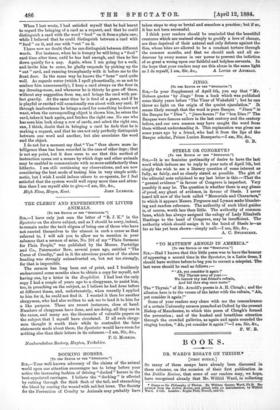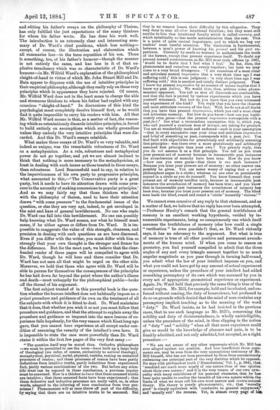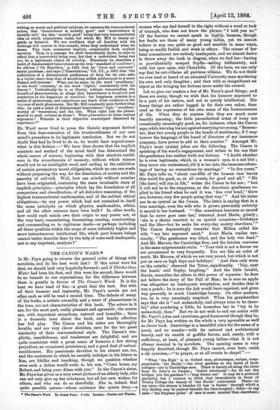BOOKS.
DR. WARD'S ESSAYS ON THEISM.* [FIRST NOTICE.] So many of these essays have already been discussed in these columns, on the occasion of their first publication in the Dublin. Review, that some of our readers may, we hope, have recognised already that Mr. Wilfrid Ward, in collecting
• Essays on the Philosophy q Theism. By William George Ward, Ph.D. Re. printed from the Dublin Review, and edited, with an Introduction, by Wilfrid Ward. 2 vols. London: Kegan Paul, Trench, and Co. and editing his father's essays on the philosophy of Theism, has only fulfilled the just expectations of the many thinkers for whom his father wrote. He has done his work well. The introduction is an extremely clear and interesting sum-
mary of Dr. Ward's chief positions, which lose nothing— except, of course, the illustration and elaboration which
all summaries lose—in the terse exposition of his son. There is something, too, of his father's humour—though the manner ie not entirely the same, and has less in it of that ex-
plosive trenchancy which was so characteristic of Dr. Ward's humour—in Mr. Wilfrid Ward's explanation of the philosophical eleight-of-hand in virtue of which Mr. John Stuart Mill and Dr. Bain appear to dispense with the use of intuitive principles in their empirical philosophy, although they really rely on those very principles which in appearance they have rejected. Of course, Mr. Wilfrid Ward. does not in the least mean to charge the able
and strenuous thinkers to whom his father had replied with any conscious "sleight-of-hand." In discussions of this kind the psychologist must completely deceive himself first, or he would find it quite impossible to carry his readers with him. All that Mr. Wilfrid Ward means is that, as a matter of fact, the reason- ing which so ostentatiously discards intuitive principles, is forced to build entirely on assumptions which are wholly groundless
unless they embody the very intuitive principles that were dis- -carded. And this Dr. Ward's essays establish.
What makes these essays of Dr. Ward's so very valuable, and indeed so unique, was the remarkable robustness of Dr. Ward
4ts a metaphysician. As a rule, robustness and metaphysical power do not go together, and yet we are almost inclined to think that nothing is more necessary to the metaphysician, at
least in dealing with such issues as those treated in these essays, than robustness. Lord Beaconsfield used to say, in relation to the imperviousness of his own party to progressive principles, what amounted to this,—' The Conservative party is a great Tarty, but it needs to have its attention drawn with some pres- sure to the necessity of making concessions to popular principles.' And so we may fairly say that those thinkers who deal with the philosophy of theism, need to have their attention -drawn "with some pressure " to the fundamental issues of the -question, or else they are very apt, indeed, to get enveloped in the mist and haze of general bewilderment. No one who reads Dr. Ward can fall into this bewilderment. No one can possibly help knowing what Dr. Ward means, nor what he himself must mean, if he either agrees or differs from Dr. Ward. It is im- possible to exaggerate the value of this strength, clearness, and precision in dealing with such questions as are here discussed.
Even if you differ with the writer, you must differ with him so strongly that your own thought is the stronger and firmer for the difference. But for the most part, we believe that the clear- headed reader of these pages will be compelled to agree with Dr. Ward, though he will here and. there consider that Dr. Ward has not seen all that might be urged on the other side. Moreover, we hold that those who agree with Dr. Ward will be .able to pursue for themselves the consequences of the principles he has laid down far beyond the point where the author's illness and death—most unhappily for the philosophical public—broke -off the thread of his argument.
The first subject treated of in this powerful book is the ques- tion whether the human intellect does not habitually impose an a priori procedure and guidance of its own on the treatment of all the subjects with which it is fitted to deal. Dr. Ward maintains that it does, that whether you wish it or not you must follow that procedure and guidance, and that the attempt to explain away the procedure and guidance so imposed into the mere lessons of ex- perience fails hopelessly, for the very reason which Kant long ago gave, that you cannot have experience at all except under con- dition of assuming the veracity of the intellect's own laws. It is impossible to state the case more powerfully than Dr. Ward states it within the first few pages of the very first essay :—
"The question itself may be stated thus. Orthodox philosophers —we must be permitted to use the term—have Wit up a large body of theological (we refer, of course, exclusively to natural theology), metaphysical, psychical, social, physical, verities, resting on sustained processes of reason ; and these processes of reason have been partly -deductions from intuitive truths, partly inductions from experienced fact, partly various combinations of the two. But before any scien- tific trust can be reposed in these conclusions, a previous inquiry must be answered. How is a thinker to know that these assumed truths are intuitive ; that these assumed facts have been experienced ; that these deductive and inductive processes are really valid, or, in other words, adapted to the inferring of true conclusions from true pre- misses ? Phenomenists will at once throw off part of the difficulty, by saying that there are no intuitive truths to be assumed. But they in no respect lessen their difficulty by this allegation. They may deny to man all other intuitional faculties ; but they must still ascribe to him that intuitional faculty which is called memory, and which indubitably no less needs authentication than the rest. This is a point of quite central importance, and to which we beg our readers most careful attention. The distinction is fundamental, between a *man's power of knowing his present and his past ex- perience. Certainly be needs no warrant to authenticate the truth of the former, except that present experience itself. To doubt my present inward consciousness, as Mr. Mill most truly affirms (p. 186), would be to doubt that I feel what I feel.' So far, then, the phenomenist and ourselves rim evenly together; but here we may come to a very broad divergence. I am conscious of a most clear and articulate mental impression that a very short time ago I was suffering cold this is one judgment: 'a very short time ago I was suffering cold;' this is another and totally distinct judgment. That I know my present impression by no manner of means implies that I know my past feeling. We would thus, then, address some pheno- menistic opponent. You tell us that all diamonds are combustible, and that the fact is proved by various experiments which you have yourself witnessed. Bat how do you know that you ever witnessed any experiment of the kind ? You reply that you have the clearest and most articulate memory of the fact. Well, we do not at all doubt that you have that present impresssion, which you call a most clear and articulate memory. But how do you know—how can you legiti- mately even guess—that the present impression corresponds with a past fact ? See what a tremendous assumption this is, which you, who call yourself a centime man of science, are taking for granted. You are so wonderfully made and endowed—such is your assumption —that in every successive case your clear and articulate impression and belief of something as past, corresponds with a past fact. Yea find fault with objectivists for gratuitously and arbitrarily assuming first principles : was there ever a more gratuitously and arbitrarily assumed first principle than your own ? You gravely reply, that you do not assume it as a first principle. You tell us you trust your present act of memory because in innumerable past instances the avonchments of memory have been true. How do you know —how can you even guess—that there is one such instance ? Because you treat your present act of memory : no other answer can possibly be given. You are never weary of urging that a priori philosophers argue in a oirole; whereas no one ever so persistently argued in a circle as you do yourself. You know forsooth that your present act of memory testifies truly, because in innumerable past instances the avouchment of memory has been true; and you know that in innumerable past instances the avouchment of memory has been true, because you trust your present act of memory. The blind man leads the blind, round and round a circle' incurably vioions: " We cannot even conceive of any reply to that statement, and as a matter of fact, we believe that no reply has ever been attempted, —Professor Huxley's remark that the general truthfulness of memory is an excellent working hypothesis, verified by in- numerable experiments, being so conspicuously one which itself assumes the truthfulness of memory (else how could a single " verification " be even possible?) that, as Dr. Ward virtually says, it has no relevancy to the argument. But what is true of memory is true of all other positive and permanent avouch- ments of the human mind. If when you come to reason on geometry, you find. yourself compelled to admit that the three angles of any and every triangle amount together to as much angular magnitude as you pass through in turning half-round, you admit what the law of your intellect imposes on you, and. what you could not have got by any amount of actual experiment or experience, unless the procedure of your intellect had added. something peremptory of its own which was assumed by you in. every act of appropriate geometrical experience or experiment. Again, Dr. Ward held that precisely the same thing is true of the moral region. Mr. Mill, for example, held and inculcated, and en- forced without ceasing, the duty of benevolence, but professed to do so on grounds which denied that the mind of man contains any peremptory implicit teaching as to the meaning of the word. "duty." Dr. Ward insists, as he had insisted in the previous cases, that to use such language as Mr. Mill's, concerning the nobility and duty of disinterestedness, is wholly unintelligible, unless the procedure of the mind, in thus slipping in the notion of " duty " and " nobility " when all that mere experience could give us would be the knowledge of pleasure and pain, is to be frankly admitted, and not only admitted, but accepted, as a right procedure :— "We are not aware of any other arguments which Mr. Mill has ever alleged against our position. And how insufficient those argu- ments are may be seen from the very unsuspicious testimony of Mr. Mill himself, who has not been prevented by them from unconsciously, embracing one principal part of the very doctrine which he opposes. He says with profoundest truth (' Dissertations,' Vol. I., p. 384), that, mankind are much more nearly of one nature than of one opinion about their own nature ;' and it is the very reason of our own sym- pathy with many exhibitions of his personal character, that he has been quite unable to confine the breadth of his own nature within the limits of what we must call his own most narrow and contra-natural theory. His theory is purely phenomenistic, viz., that •' morally good' is simply equivalent with conducive to general enjoyment,' and morally evil' the reverse. Yet, In almost every par of 144 writing on moral and political subjects, he assumes the transcendenta/ axiom, that benevolence is morally good' and malevolence is morally evil,' the idea morally good' being that very transcendental idea on which objectivists insist, but which Mr. Mill in theory re- gards as delusive. We are confident that all familiar with his writings will concur in this remark, when they understand what we mean. This view, constantly implicit, occasionally finds explicit mention. Thus, in a passage we shall immediately quote, he says in effect that a benevolent being may, but that a malevolent being can not, be a legitimate object of worship. Elsewhere he describes a habit of disinterested benevolence as the true standard of excellence'; he affirms (' On Hamilton,' p. 123) that he loves and venerates' moral goodness ; and says (' Dissertations,' Vol. III., p. 340) that the cultivation of a disinterested preference of duty for its own sake is a higher state than that of sacrificing selfish preferences to a more distant self-interest.' What can be mean by the word excellence,' or the word venerate,' or the word higher,' consistently with his theory ? Undoubtedly he is at liberty, without transcending the bounds of phenomenism, to allege that benevolence is beneficent and conducive to the happiness of mankind for happiness consists in a series of phenomena, and experience can teach what conduces to the increase of such phenomena. But Mr. Mill constantly goes further than this he calls a habit of disinterested benevolence ' high," excellent,' worthy of veneration,' and the like. What right has the pheno- rnenist to such notions as these ? What phenomena do these notions represent ? Wherein is their objective counterpart discerned by experience ?"
Dr. Ward never lived to press the theistic argument derived from this demonstration of the trustworthiness of our own mind's procedure to its legitimate conclusion. But we do not doubt that had he lived to do so, be would have argued some- what in this fashion We have then shown that the implicit contents and method of the mind itself has determined the whole course of science, beginning with that absolute confid- ence in the avonchments of memory, without which science would not be an intelligible word, and ending in the exhibition of certain peremptory moral obligations, which no one can evade without preparing the way for the dissolution of society and the anarchy of self-will. Well, how can minds without number have been originated, containing the same invaluable store of implicit principles,—principles which lay the foundation of all comparison and classification, of all deductive reasoning, of the highest transcendental mathematics, and of the noblest ethical obligations,—by any power which had not contained in itself the same principles on which physics, mathematics, ethics, and all the other sciences have been built ? In other words, how could such minds owe their origin to any power not, at the very least, remembering, forecasting, causing, constructing, and commanding us to righteous deeds—or perhaps including all these qualities within the scope of some infinitely higher and more instantaneous intellectual life, which poor human beings cannot better describe than by the help of some such inadequate, not to say impotent, analysis?'




































 Previous page
Previous page